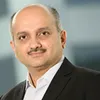Born poor and raised in a village hut, how this entrepreneur built a Rs 10 Cr business
Sandip Patil had a rough childhood, but he went on to start E-Spin Nanotech and make nanofibers for cancer diagnosis, optical sensors, air filtration, etc. Here's his incredible story.
It is often said that one can create his/her own luck. But it is difficult to believe in luck when you're in a situation similar to Sandip Patil's.
Sandip was raised in a small mud house in Pimpri, a village in Maharashtra. His illiterate parents worked as contract labourers, and Sandip and his siblings often went to bed hungry.
The village he lived in lacked basic healthcare and education facilities, and Sandip struggled to get a good education. But if someone looks at how successful he is now, it is easy to assume he had a privileged childhood.
Sandip is the Founder of E-Spin Nanotech, a Kanpur-based company that makes nanofibres for cancer diagnosis, optical sensors, air filtration, and other uses.
The company now makes over Rs 2 crore a year and is on track for Rs 10 crore this year, he says.
This is money Sandip couldn't even begin to comprehend as a boy who grew up watching his parents struggle to put food on the table.
Now, that same boy has turned into a village celebrity.
“For most people, the comforts of a high paying job are the natural choice. But for risk takers like me, taking the entrepreneurial route in nanofibre production served as a test of endurance, leading to better results. My success has earned me a lot of respect in my village. I get invited to marriages and functions as a chief guest," the 32-year-old tells SMBStory.

Sandip Patil, Founder, E-Spin Nanotech
But Sandip's success stems from one key incident in his childhood: his uncle taking him to a nearby village and enrolling Sandip in a school.
The turning point
Sandip hailed from a village where 75 percent of the people were tribals. So when his uncle took him to Dhandra, a neighbouring village, it gave him a chance to break away from his old life and join a school.
"Dhandra had a high literacy rate and most of the children here attended school. During my time there, I attended school and heard some stories about the Patil brothers, who were involved in science. I became curious and unknowingly developed a fascination for the field of science and research,” he says.
Sandip would get excited looking at the mechanical repair work of televisions and diesel engines in the village.
But he still had family back home. After graduating from school, Sandip returned to Pimpri. He continued studying, but also helped his mother who had started a small shop in the village.
“Being the eldest son, I had to bear some responsibilities. Mornings were spent in school, evenings in the shop and nights amidst books,” he adds. “I returned to Dhandra to complete my senior secondary education and later got into a BTech programme.”
Sandip failed the first year, but he kept pushing forward and finally made it to IIT Kanpur, where he joined a PhD programme.
Here, he noticed one of his colleagues struggling to design and assemble an E-Spin machine. This was a turning point for Sandip.
The task was assigned to him. He successfully completed the task, and, in the process, realised his core strength and key interest area: transforming technology into products.
E-Spin Nanotech
The incident with the E-Spin machine triggered Sandip's interest in nanotechnology products.
At the time, India was facing the challenge of creating a cost-effective solution for nanofibre research and fabrication due to quality issues and workforce problems.
“After months of thorough research, I cracked the problem and discovered that India has a huge market for nano products. I wanted to start my own company.”
Taking some business advice from friends, he launched E-Spin Nanotech in 2010, with the help of the SIDBI Incubation and Innovation Centre (SIIC) at IIT Kanpur.
“I was happy to get into the research and development of high quality, low-cost nanofibre units, and these have a wide range of applications,” he says.
When it was launched, most nano machines used in India were imported. Sandip wanted to cut down these imports by “designing more efficient and cheaper products with excellent back-up services,” and tried to “bring other companies onto a single platform.”
Location and resources were Sandip's biggest hurdles in the company. He had no workshop of his own and had to outsource the manufacturing part.
"Kanpur doesn't have any good manufacturers who can provide good quality components. So, I had to go to Delhi to look for one,” he says. “It was also difficult to find a trained and highly motivated workforce in Kanpur. However, I believed that if the employees lived near their families, they’d work hard and even save money. So, I decided to hire young people from the city and train them.”
At the moment, E-Spin’s clients include major research labs in India and it has an annual turnover of Rs 2.2 crore.
“Now, we are also going to get into nanofibre-based air filtration areas, where the products will be face masks and cabin air filters,” Patil explains.
He also wants to turn E-Spin from a private limited company into a public limited entity. “With a good manufacturing setup and unique process designs, other players can also enter this space. My own company as well as others will further benefit if we receive state support in getting more tenders,” he adds.
(This story is published in partnership with the Ministry of MSME to showcase success stories of SMEs)









